

Click map to see detailed route


Click map to see detailed route

6 September Batumi & Kutaisi
In the Mafia Wonderland of Abazhidze
I was rudely woken in the morning by an uniformed man. "Passport! Passport!" said this fat guy with the badge "Customs Department of Batumi, Adjaran Autonomous Republic." The train has entered the territory of this mafia-like, almost fully independent statelet, and its notoriously corrupt officers were showing who's the boss here.
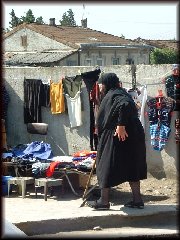 Adjara
is a small autonomous republic within Georgia created by Lenin in 1921
around the port city of Batumi, right next to the Turkish border.
The Adjars are ethnically and linguistically Georgian, though Muslims by
faith, in contrast to the Orthodox Christianity professed by most Georgians.
It's bizarre that the world's first atheist state would have created an
artificial country based on religion, but this was yet another example
of the divide and rule policy of the Bolsheviks. This border meant
little in the Soviet days until Aslan Abashidze became Chairman of the
Adjaran Parliament in 1991. With Soviet collapse and the subsequent
chaos within Georgia, Abashidze turned Adjara into his personal private
kingdom. He exploited Batumi's position as a chief port of Georgia
and cultivated trade with neighbouring Turkey. He collects taxes
from the booming trade but passes little to Tbilisi. He became extremely
wealthy and built up his private Adjaran Army, not to mention support from
the Russian military base in Batumi. He traded verbal blows with
Georgian President Shevardnadze and accused Tbilisi of repeatedly trying
to assassinate him. This also explains the large number of Adjaran
soldiers I saw around the Adjaran Parliament and Abashidze's residence.
One never knows what may happen in the future. With Russian support,
Abashidze may even declare Adjara independent; If Russian support is withdrawn,
Georgian troops may well march in to end Abashidze's nonsensical state.
Adjara
is a small autonomous republic within Georgia created by Lenin in 1921
around the port city of Batumi, right next to the Turkish border.
The Adjars are ethnically and linguistically Georgian, though Muslims by
faith, in contrast to the Orthodox Christianity professed by most Georgians.
It's bizarre that the world's first atheist state would have created an
artificial country based on religion, but this was yet another example
of the divide and rule policy of the Bolsheviks. This border meant
little in the Soviet days until Aslan Abashidze became Chairman of the
Adjaran Parliament in 1991. With Soviet collapse and the subsequent
chaos within Georgia, Abashidze turned Adjara into his personal private
kingdom. He exploited Batumi's position as a chief port of Georgia
and cultivated trade with neighbouring Turkey. He collects taxes
from the booming trade but passes little to Tbilisi. He became extremely
wealthy and built up his private Adjaran Army, not to mention support from
the Russian military base in Batumi. He traded verbal blows with
Georgian President Shevardnadze and accused Tbilisi of repeatedly trying
to assassinate him. This also explains the large number of Adjaran
soldiers I saw around the Adjaran Parliament and Abashidze's residence.
One never knows what may happen in the future. With Russian support,
Abashidze may even declare Adjara independent; If Russian support is withdrawn,
Georgian troops may well march in to end Abashidze's nonsensical state.
Upon arrival, I went straight to the Yacht Club where well-to-do "New
Georgians" (most probably beneficiaries of dodgy privatisation programmes
aka Christmas Presents for State Cronies) spend their summer vacations.
There I had adjarpuri - the Adjaran version of the Georgian khacharpuri,
which looks like a flour-made boat with an egg over a bed of melted cheese.
Great treat! Apart from that, there wasn't much to do... I wondered
around the town taking photos of less well-to-do locals and fighting off
the persistent attention of taxi drivers who offered anything from a no-frills
ride to the affections of local women.
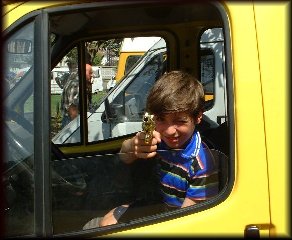 |
 |
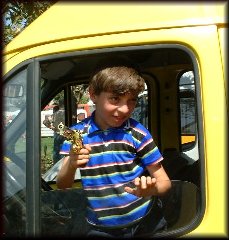 |
|
|
||
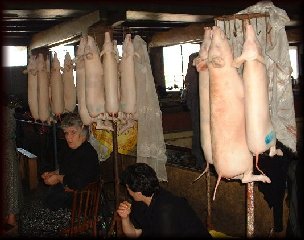 |
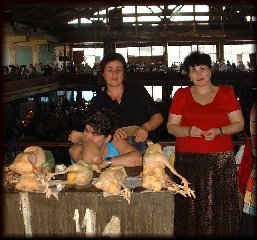 |
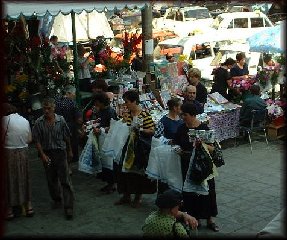 |
|
|
|
|
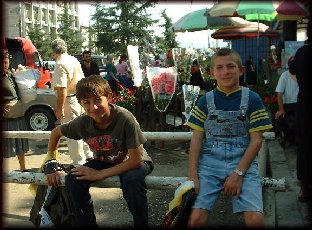 |
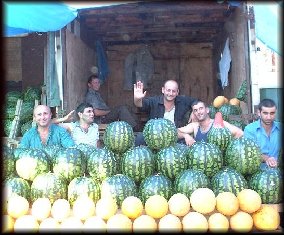 |
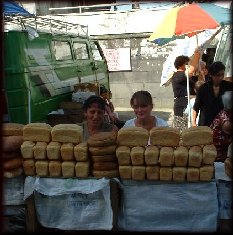 |
Moving Into an ex-luxury hotel turned refugee camp
By noon, I set off for Kutaisi in a mashrut. Again, we were examined when we reached the Adjaran border. Huge concrete blocks were laid across the road in a zig-zag manner, while Adjaran officials checked the documentation of passing vehicles. Either the Adjarans were afraid of Georgian suicide bombers or the onslaught of Georgian armoured forces. Strange enough, there weren’t any soldiers on the Georgian side. In fact, there weren’t any Georgian police post at all. In this little bizarre corner of Georgia, fear seems to be one-sided and all the whims and imagination of a man with an oversized ego.
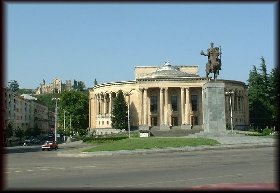 Entering
Georgia proper, we passed the homeland of Shevardnadze, Guria, also a swampy
land with supposedly humorous people. Bashbushkas stood by the road
side offering fish and local delights. Before long we entered Imereti,
the heartland of western Georgia, and its capital, Kutaisi.
Entering
Georgia proper, we passed the homeland of Shevardnadze, Guria, also a swampy
land with supposedly humorous people. Bashbushkas stood by the road
side offering fish and local delights. Before long we entered Imereti,
the heartland of western Georgia, and its capital, Kutaisi.
Kutaisi, Georgia's 2nd largest city and centre of the legendary kingdom of Colchis, where Jason and his Argonauts came to steal the Golden Fleece and left Colchis with the king's daughter as well. This was also where in the 11th C, king David IV the Builder began his campaign to unify Georgia, thus beginning the Golden Age of Georgian history, a period that lasted through his great grand-daughter, Queen Tamara, whose image could be seen all over Georgia today.
I went to Hotel Kutaisi, once a luxury hotel in the city centre, but since the bitter civil war in Abkhazia, has been turned into a refuguee camp. 10 rooms were reserved for tourists but the rest were given free to refugees from that breakaway region in the northwest, which with Russian support, had effectively become independent. I felt no threat at all staying here... the locals are as friendly as ever - in fact more hospitable that the natives of the capital. Within a few hours of arrival, locals were buying me coffee and ice cream in the cafe located in the city park right next to the hotel.
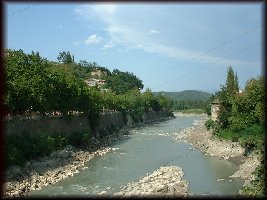 One
more thing – like everywhere else in Georgia, water is by no means a certainty
in Hotel Kutaisi. The bath tub has been filled with water and that
is my only source of bath water for the day… certainly clean and organic
– where else can you find cute insects swimming in the bath tub ?
Wow, talk about snorkeling and pond life… you have it here too.
One
more thing – like everywhere else in Georgia, water is by no means a certainty
in Hotel Kutaisi. The bath tub has been filled with water and that
is my only source of bath water for the day… certainly clean and organic
– where else can you find cute insects swimming in the bath tub ?
Wow, talk about snorkeling and pond life… you have it here too.
I walked around the city, and visited the ruins of the magnificent Bragratid
Cathedral built by David IV the Builder, one of the greatest Georgian monarchs.
Born in 1073, David united the kingdoms of Georgia, from his capital here
in Kutaisi. This was the Golden Age of Georgia, where arts, literature
and culture flourished, and when Georgia was a great power to reckon with
in the Middle East. Today, even in its ruined state, the Bragratid
Cathedral look amazingly spectacular. It stood on a hill overlooking
the city, and what appeared to be a new cross erected in front of it, probably
a symbol of a newly restored independence and revitalised faith.
Here I met a group of Americans who’s out on a aid trip to Georgia.
They were Georgians too – I mean Atlanta, Georgia. We had a nice
chat and a good laugh. They all seem to have a great time – who wouldn’t
in hospitable Georgia ?
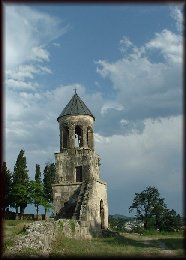 |
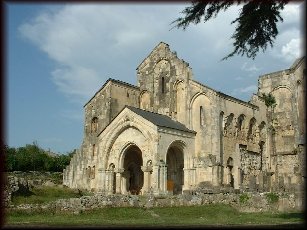 |
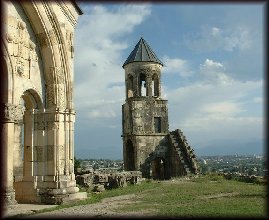 |
|
|
![]() 7
- 8 September Kutaisi – Tbilisi
7
- 8 September Kutaisi – Tbilisi
More Frescoes